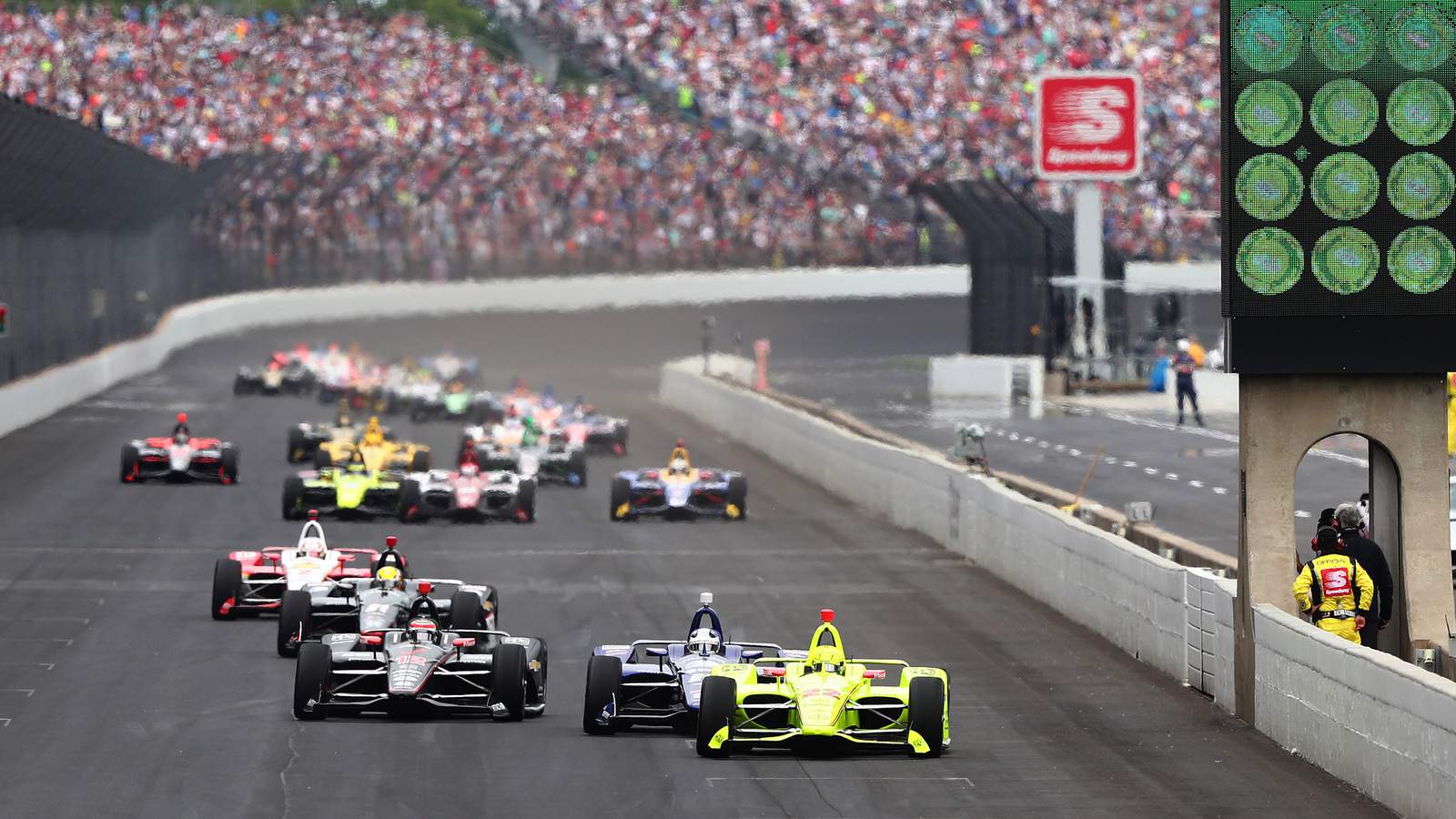" We’re determined to do whatever we need to do, even if it’s non-traditional, to make this the best possible experience during the pandemic,” Miles told IndyStar in an exclusive interview Friday. “We feel like it’s our responsibility to do that, and we hope people will trust us to look out for the greater good here. "

Fans at 2020 Indy 500: IMS plans to allow 50% capacity
As concern and questions continue to grow about the feasibility of America’s stick-and-ball sports ramping back up in the coming weeks, Roger Penske on Friday made a resounding, concrete statement about the status of the largest single-day sporting event in the world.
The new owner of the Indianapolis Motor Speedway, as well as the IndyCar series, laid out the first major details of how he plans to host his first Indy 500 as the steward of the Greatest Spectacle in Racing – using numbers that feel both small, in terms of attendance in the event’s 109-year history, and quite large when looking at circumstances around the country amid the coronavirus pandemic.
In a letter to current ticket holders, Penske, IMS president Doug Boles and Penske Entertainment Corp. president and CEO Mark Miles announced that fans will be able to attend this year’s race up to 50% capacity of the entire venue, whose total capacity is estimated to be 350,000. That means in less than two months, the town of Speedway, Marion County and the state of Indiana could play host to roughly 175,000 race fans at IMS – likely the largest one-day centralized gathering of people anywhere in the world since the coronavirus pandemic spread rapidly across the country in February and March.
The news signals numerous short and long-term economic and health effects for the series and its ownership company, as well as the city and state, but amid it all, Miles pointed toward the hours upon hours Penske Entertainment Corp. officials have spent in meetings with state and local government and health officials fine-tuning their plan to meet the unique circumstances of an event that, in a normal year, is already a massive undertaking.
“The details may change in the coming weeks, but we’ve still got (nearly) two months.” The race is set for Sunday, Aug. 23.
The ticket details
Friday’s email to the thousands of people who hold some of the 175,000 tickets distributed for this year’s race was as much reassurance from IMS to its loyal customers as a desperate plea for understanding. In it, fans were directed to create or log into their IMS.com ticket account to address a survey targeting how they would like to approach using – or not using – their batch of tickets for 2020. IMS asks that the survey be filled out by July 6.
Fans have been given the option to hold onto their full batch of tickets, return part of them or relinquish them all for this year.
None of those actions will affect their seniority rank or right to renew tickets for the 2021 Indy 500. Fans will be allowed to renew for next year in the days after this year’s race – similar to any other year, but with an August race rather than one in May.
IMS can guarantee only that 50% of folks’ original ticket allotments (i.e. 10 of 20 tickets in their name) will remain in the same general seating area as IMS plans to move fans around in the grandstands to allow for proper social distancing in bleachers come race day.
Fans wishing to hold onto more than 50% of their allocation will be prompted to prioritize which general locations they wish for the rest of their seats to be – including their original location – though Miles and Boles asserted that those folks are likely to see their seats moved to somewhere else. Additionally, all race day tickets will be redistributed. Tickets already in possession can be kept, though they are no longer valid.
And those too apprehensive to attend the race in 2020 – which Miles and Boles anticipated to be a significant amount from the pool of 175,000 tickets sold – not only won’t lose their seniority, but will be offered an account credit good for other IMS events, including 2020 Indy 500 practices, qualifying days, Carb Day, the Harvest Grand Prix in October or toward the renewal of their 2021 tickets.
Such a credit procedure is not in place for any other on-track fan-related events around this year’s race, meaning fans can only seek to put their money for attending this year’s race toward another event. General admission tickets to events like practice, qualifications and Carb Day are still non-refundable, though attendance for those events will not be curtailed by capacity percentages.
How fans will be able to use components like bronze badges for paddock and pit lane access is to be determined once more detailed health regulations are in place.
Folks holding suite access passes on race day were sent a separate email Friday clarifying that no action is required from them now, and no messaging was sent to folks who still hold general admission passes for the infield, though that number has significantly declined due to the cancellation of the Snake Pit concerts in 2020.
Health concerns addressed
Friday’s letter also urged folks 65 years and older – which includes some of the most tenured annual fans around the 2.5-mile oval – along with those suffering from concerning underlying health conditions to consider staying home in 2020. At the gate, a cloth mask and a bottle of hand sanitizer will be given to each patron, and though mask wearing won’t be strictly enforced, use of masks is “recommended” by the track.
It’s a measure reaffirmed just this week by Dr. Anthony Fauci, the top infectious disease expert at the National Institutes of Health.
“”I’ll be very consistent and I’ll say it yet again, that you should not congregate in crowds. You should keep distance,” Fauci told House lawmakers Tuesday. “If you do, please wear a mask. And as you wear a mask, and you’re in a situation where you’re getting animated – in a demonstration, or in a rally, or wherever you are – avoid as best as possible the urge to pull your mask down and shout.”
Fans can expect more in-depth health guidelines to be distributed in July, but Miles emphasized what he considered one of the most important factors he believed would allow IMS to move forward with this year’s race in the face of a pandemic: the added safety of an outdoor event held during the blistering Midwest summer heat and humidity.
“The prevailing view among health officials is that an outdoor summer event is less conducive to the spread of the virus than other environments,” Miles said. “Still, we plan to use different procedures from environments that are outdoors compared to environments that are indoors – like elevators, restrooms and suites. We’ll take a look at areas of particularly great congestion or density, where a lot of people traditionally are together and think about how we can manage those situations appropriately.”
Miles and Boles clarified that restrictive digital app technology, like that hinted at by Texas Motor Speedway president Eddie Gossage earlier in July that would give fans specific times to enter and exit the track and also control their bathroom and concession trips won’t be used.
Other implications: local blackout, future ticket sales
At the moment, IMS plans to keep the decades-old policy of the local television blackout, despite the restriction on attendance for this year’s race. Fans who hold tickets as of June 26 should have no issue attending this year’s race, if they so choose, but once the survey results come back and the IMS ticket office can reassess how many reaffirmed commitments they have in place, they’ll determine how many tickets can still be sold up to that 50% cap.
Ticket sales have not been halted at the moment, though they’ll only be processed as “requests” until after July 6, at which time IMS can determine how many more they can honor – and in what locations.
But as happened most recently in 2016, when grandstand seating sold out the first week of May and all ticket sales for the race ceased four days before the green flag, there’s a very real chance IMS reaches what they’ve determined to be their new “capacity” level under the unique 2020 circumstances.
Four years ago, even as ticket sales tracked for an all-time mark, Boles and Miles asserted throughout most of May that local fans would have to attend in order to watch live, and still nearly two months out, that still holds true.
“We were still this way in 2016, and our focus in 2016 was selling the place out,” Boles said. “Our focus right now is to make sure we can operate the Indy 500 with the fans that want to be here, that they can attend, and we’ll see where it goes.”
Miles told IndyStar: “You should not contribute to fans expecting there to be a lifting of the blackout. “(Local fans) should assume that it’s delayed, that you can see it later in the day in this market.”
In all, it makes up what Miles believes is a strong plan with every question big or small either already addressed or in the process of being addressed. Because racing will be months underway come August, he said Friday he believes IndyCar will be buoyed by more real-life experience – both from their own fan-attended races in July as well as those of NASCAR – than any other sport planning to make massive leaps in late July or early August.
Combined with the doubled-down dedication of the series and track’s new owner, Miles doesn’t see why, under current health conditions, the plan released and detailed Friday should hit any serious roadblocks.
“We feel we’ve really refined and practiced and executed an excellent set of guidelines and procedures at the moment. The most of what you’re reading about other sports right now, with teams being affected and participants having to sit out, we’re looking at it all every day, but we take some comfort knowing we’ll have a lot of experience to implement this and learn from others,” Miles said. “Racing isn’t basketball or football.
“The success of all this is very important to us, but not just in a financial sense. It’s about fans. You know well how many people really care about being here and about the race and this place, and we want to be able to deliver a good experience for them and be able to play a role and help the ongoing reopening of this state and economy.”
Original article 27.06.20 by IndyStar motor sports reporter Nathan Brown
To view the original article click here
© The Fan Experience Company 2020
